1. Compare EV Policies in Key Markets Like China, the EU, and the U.S.
The race to lead the global electric vehicle (EV) revolution is intensifying as countries and regions around the world look to secure a prominent position in the rapidly growing EV market. EV adoption is no longer just an environmental goal but a strategic economic and geopolitical issue, with nations vying for leadership in manufacturing, technology, and infrastructure. Three of the most influential players in this global race are China, the European Union (EU), and the United States, each of which has implemented distinct policies and strategies to accelerate the transition to electric mobility.
China’s Aggressive EV Push
China is widely considered the leader in the global EV market, with the largest EV sales volume and the most comprehensive government support for the transition to electric vehicles. The Chinese government has long viewed the development of electric vehicles as crucial for reducing air pollution, improving energy security, and positioning the country as a global leader in green technologies.
China’s EV policies have been characterized by aggressive subsidies, tax incentives, and regulations aimed at both promoting domestic EV production and encouraging consumer adoption. The government has provided substantial financial support for EV manufacturers, with state-backed initiatives offering subsidies for both production and consumption. For instance, the New Energy Vehicle (NEV) mandate in China encourages automakers to produce electric, hybrid, and hydrogen-powered vehicles by offering subsidies for these vehicles’ sale and purchase.
Additionally, China has been investing heavily in building EV infrastructure, with a vast network of charging stations across the country. As of 2024, China boasts over 1.5 million public charging stations, far outpacing any other country. This extensive charging infrastructure makes owning and operating an EV in China more convenient than in many other parts of the world.
China also has a clear regulatory framework for EV adoption. The government has set ambitious targets to make 25% of all vehicles sold by 2025 electric, and it is aiming for an all-electric or hybrid vehicle fleet by 2035. These targets are backed by robust policies that include restrictions on the sale of internal combustion engine (ICE) vehicles in some regions and quotas for automakers to produce electric vehicles. The country’s major automakers, such as BYD, NIO, and XPeng, have become global leaders in EV production, making China a dominant force in the industry.
The European Union’s Green Deal and EV Policies
The European Union has also positioned itself as a key player in the global race to lead the EV revolution, though its approach has been more focused on environmental sustainability and reducing carbon emissions. The EU has been at the forefront of global climate policies, with its ambitious “European Green Deal” outlining a pathway to carbon neutrality by 2050. This plan includes a strong emphasis on decarbonizing the transportation sector, which is one of the largest sources of greenhouse gas emissions in Europe.
The EU’s approach to EV adoption involves a combination of regulations, incentives, and infrastructure development. One of the key policy drivers is the EU’s emissions standards, which impose stringent carbon dioxide (CO2) limits on automakers. These regulations are designed to force automakers to transition to cleaner vehicles, including electric vehicles, by imposing hefty fines on manufacturers who fail to meet CO2 targets. This has prompted European automakers like Volkswagen, Renault, and BMW to shift their focus toward electric mobility.
In addition to regulatory measures, the EU has implemented various subsidies and incentives to encourage consumer adoption of EVs. These include grants for the purchase of EVs, tax credits, and incentives for EV charging infrastructure development. Many EU member states, including Germany, France, and the Netherlands, have national programs that further incentivize the purchase of electric vehicles, making EVs more affordable for consumers.
Furthermore, the EU has committed to significantly increasing its charging infrastructure. The European Commission has proposed a plan to deploy over 1 million public charging points by 2025. The goal is to ensure that EV owners have access to fast and convenient charging across the entire continent, further stimulating the adoption of electric vehicles.
The United States’ EV Policies and Challenges
The United States, historically a major player in the automotive industry, has also entered the EV race with increasing momentum. However, the approach to EV adoption in the U.S. has been more fragmented due to political differences and a lack of a cohesive national strategy for the transition to electric vehicles. That said, the federal government, along with individual states, is playing a critical role in accelerating EV adoption.
Under the administration of President Joe Biden, the U.S. has committed to ambitious EV targets, including the goal of having 50% of all new vehicle sales be electric by 2030. This goal is part of a broader climate agenda aimed at reducing greenhouse gas emissions across all sectors of the economy. Biden’s infrastructure plan includes significant investments in EV charging infrastructure, with $7.5 billion earmarked for building a national network of charging stations. This funding is designed to ensure that all Americans, regardless of where they live, have access to convenient and affordable EV charging.
In addition to federal efforts, several U.S. states have adopted their own policies to promote EV adoption. California, in particular, has been a leader in pushing for stricter emissions standards and incentivizing the adoption of electric vehicles. The state has set ambitious goals, such as banning the sale of new gas-powered cars by 2035 and requiring automakers to sell a significant percentage of electric vehicles.
However, challenges remain in the U.S. EV market. One of the key obstacles is the lack of uniformity in policies across states, with some states offering generous EV incentives while others do not. Additionally, the high cost of EVs remains a barrier for many consumers, especially in rural areas where charging infrastructure may be limited. Although the U.S. has made strides in EV adoption, achieving the ambitious targets set by the Biden administration will require overcoming these hurdles.

2. Discuss the Role of Government Funding in R&D and Infrastructure Development
Government funding plays a crucial role in accelerating the development of electric vehicle technology and building the necessary infrastructure to support widespread EV adoption. In all three of the major markets—China, the EU, and the U.S.—governments have committed substantial resources to research and development (R&D) and infrastructure expansion, which are critical to the success of the EV revolution.
R&D Investments
China has invested heavily in EV research and development, focusing on improving battery technology, energy efficiency, and manufacturing processes. The government has provided significant subsidies and incentives to Chinese automakers and battery manufacturers to advance EV technology. Major Chinese companies, such as CATL, the world’s largest battery maker, have benefitted from government-backed R&D funding, which has enabled China to dominate the global EV supply chain.
In the EU, governments have also made substantial investments in R&D, particularly in areas like battery innovation, charging technologies, and the development of lightweight materials for electric vehicles. The European Commission has been a strong proponent of funding collaborative R&D projects between automakers, suppliers, and research institutions. The EU’s “Horizon Europe” program, which has allocated billions of euros for clean energy research, includes a significant portion dedicated to advancing electric vehicle technologies.
The U.S. government, through agencies like the Department of Energy (DOE), has funded numerous R&D programs focused on improving EV technology. These investments have targeted areas such as battery performance, charging speed, and vehicle range. The DOE’s “Advanced Vehicle Technology” program has supported the development of cutting-edge battery technologies, with the aim of reducing costs and improving performance to make EVs more accessible to consumers. These investments are crucial in maintaining the global competitiveness of the U.S. auto industry as other countries also push forward with their own EV innovations.
Infrastructure Development
Governments in all three regions have recognized that the development of charging infrastructure is essential for the widespread adoption of electric vehicles. In China, the government has been proactive in building an extensive network of charging stations, with a focus on ensuring that EV owners have access to charging points both in urban and rural areas. In addition to public charging stations, China has also invested in fast-charging networks, which have significantly reduced charging times, making EVs more convenient for consumers.
In the EU, the European Commission has been working to establish a seamless charging network across member states. The EU has proposed regulations that require member states to deploy a sufficient number of public charging stations to meet demand. Additionally, private companies, including energy giants and automakers, have been working alongside the government to expand the charging infrastructure. The EU’s goal of 1 million charging points by 2025 is a testament to the region’s commitment to making EVs a mainstream transportation option.
In the U.S., the Biden administration has allocated $7.5 billion to support the creation of a national EV charging network. This funding is aimed at making charging stations more accessible, particularly in underserved areas, to ensure that EV ownership is convenient for all Americans. The federal government is also working with state and local governments to provide incentives for private companies to build charging infrastructure, further expanding the network.
3. Highlight the Geopolitical Competition for Dominance in the EV Industry
The global push for electric vehicles is not just about environmental sustainability; it is also about securing economic and geopolitical power in an emerging industry. As the world transitions to electric mobility, the countries that lead in EV production, battery manufacturing, and charging infrastructure stand to gain a competitive edge in the global economy.
China’s Dominance in the EV Supply Chain
China has positioned itself as the global leader in the EV revolution, not only in terms of vehicle sales but also in the critical areas of battery production and raw material supply. The country’s dominance in the electric vehicle market is driven by its control over key supply chains for materials such as lithium, cobalt, and rare earth metals, which are essential for EV batteries. China is the world’s largest producer of lithium-ion batteries, and its companies, such as CATL, have become major players in the global battery market.
In addition to its manufacturing prowess, China is also aggressively expanding its global influence in the EV sector. The country has made significant investments in electric vehicle startups in Europe, the U.S., and other markets. This strategy has helped China establish itself as a key player not just in
EV production but also in the development of global EV infrastructure.
The EU’s Strategic Positioning
The EU is taking a strategic approach to competing with China in the EV market, focusing on reducing its reliance on Chinese-made batteries and establishing its own competitive supply chains. The European Commission has made substantial investments in the development of battery production facilities within the EU, aiming to create a European battery alliance that can rival China’s dominance. Companies such as Volkswagen and BMW are also heavily investing in their own EV production capabilities to ensure that Europe remains a global leader in clean mobility.
The U.S.’s Efforts to Catch Up
The U.S., while behind China and the EU in some respects, is making significant strides in the EV race. The Biden administration’s focus on clean energy and electric vehicles is expected to position the U.S. as a key player in the global EV market. American automakers, such as Tesla, General Motors, and Ford, have been leading the charge in electric vehicle innovation. Tesla, in particular, has become a symbol of American leadership in the EV industry.
However, the U.S. still faces challenges in competing with China and Europe, particularly in terms of battery production and raw material sourcing. To address these challenges, the U.S. has been working to develop its own domestic supply chains for critical minerals and is investing in battery manufacturing capabilities through initiatives like the “American Jobs Plan.”
Conclusion
The global race to lead the electric vehicle revolution is underway, with China, the European Union, and the United States all vying for dominance in this critical industry. Each of these regions has developed distinct policies and strategies to accelerate the adoption of electric vehicles, focusing on R&D, infrastructure development, and manufacturing capabilities. The geopolitical competition for control of the EV market is intensifying, as nations understand that leadership in this industry is not only an economic opportunity but also a strategic imperative in the fight against climate change. The future of transportation will be shaped by the success of these nations in navigating the challenges and opportunities presented by the electric vehicle revolution.











































